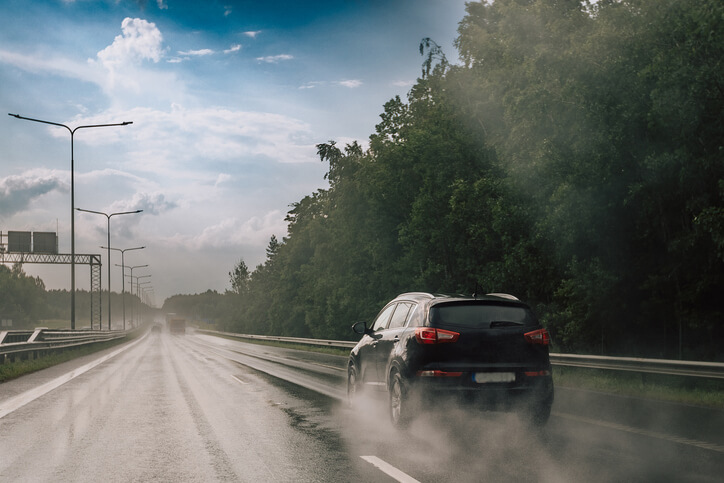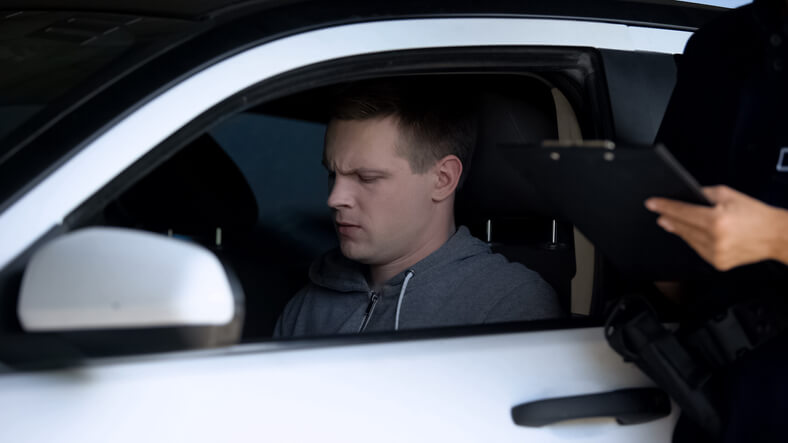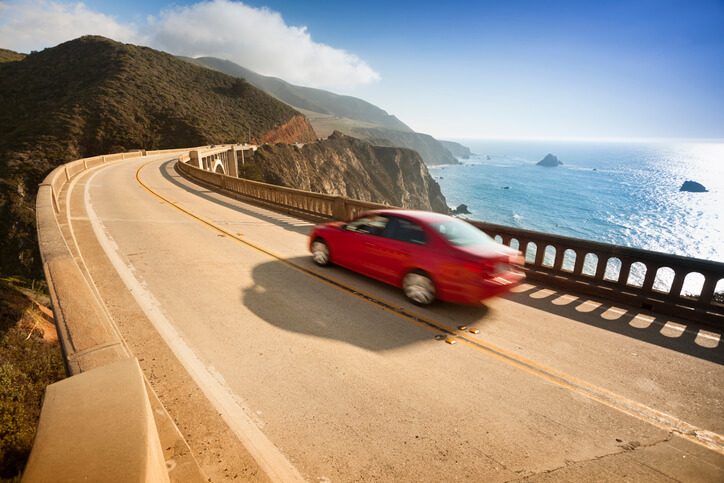Picture this: You’re driving home after a long day at work, and you make a split-second decision to speed up a little or change lanes without signaling. Suddenly, you see flashing lights behind you, and you’re being pulled over for reckless driving. In California, a reckless driving ticket can have serious consequences that go beyond a simple fine. In this blog post, we will delve into the world of reckless driving ticket California, exploring the legal definition, consequences, and defense strategies to help you navigate this complex issue.
We will also discuss the available reductions and plea bargains, such as wet and dry reckless driving, as well as how attending traffic school can help mitigate the effects of a reckless driving ticket. Whether you have been charged with reckless driving or simply want to better understand the laws and consequences surrounding this issue, this blog post is your comprehensive guide to reckless driving ticket California.
Key Takeaways
- Reckless driving in California is defined under Vehicle Code 23103 and can lead to serious legal repercussions, including license points and suspension, fines & penalties, increased insurance premiums.
- Legal defenses such as lack of intent, necessity defense or mistaken identity may be used to contest a reckless driving charge.
- Reduced charges such as wet/dry reckless driving & attending traffic school are available options for drivers facing reckless driving tickets.
Understanding Reckless Driving Tickets in California

Reckless driving in California is a serious offense with potentially severe consequences. Under California Vehicle Code 23103, reckless driving is considered a major offense. It is defined as driving with a willful or wanton disregard for the safety of persons or property. Examples of such behavior include speeding over 100mph, driving under the influence, and running red lights or stop signs.
A conviction for reckless driving can have serious consequences, including:
- A county jail sentence of up to 90 days
- A fine of up to $1,000
- License points and suspension
- Increased insurance premiums
- Other criminal charges related to the same incident
Grasping the legal definition of reckless driving, along with the behaviors that constitute this offense, can aid drivers in steering clear of such risky actions and can enhance their understanding of the potential repercussions of receiving a reckless driving ticket.
The ensuing sections will detail the specifics of reckless driving in California, encompassing the legal definition, instances of reckless driving behaviors, and the outcomes of receiving a reckless driving ticket.
How Reckless Driving is Defined
Under California Vehicle Code 23103, reckless driving is defined as the willful or wanton disregard for safety with known risk of harm. This legal definition implies that the person is aware of the potential for significant harm that their actions may cause while driving, yet they still decide to disregard this risk. For a prosecution to establish reckless driving under California Vehicle Code 23103, they must demonstrate that the individual acted with a wanton disregard for safety, was cognizant of the potential for harm, and deliberately disregarded that potential in a reckless driving case.
A person can be deemed to have wanton disregard for safety when they are aware of the substantial, unjustifiable risk of harm posed by their actions, e.g. reckless driving accidents. Nevertheless, they intentionally disregard this risk. Grasping this definition and the prerequisites for establishing reckless driving can enhance a driver’s understanding of this offense’s severity and the potential outcomes they may face if charged with reckless driving in California.
Examples of Reckless Driving Behaviors
Examples of reckless driving behaviors include excessive speeding, driving under the influence of drugs or alcohol, and participating in illegal street racing, all of which are violations of California Vehicle Code Section 23103. Excessive speeding is defined as surpassing the posted speed limit or driving at a speed that is not suitable for the existing conditions, which can lead to a speeding ticket or even a reckless driving charge.
Driving under the influence (DUI) involves operating a motor vehicle while impaired by drugs or alcohol, posing a significant risk to the safety of others on the road. Illegal street racing, another example of reckless driving behavior, involves participating in unauthorized speed contests, often on public roads, endangering both the participants and bystanders.
Recognizing and avoiding such reckless driving behaviors can lower the risk for drivers of receiving a reckless driving ticket and its associated repercussions. Moreover, comprehension of these behaviors can assist drivers in making safer decisions on the road, offering protection for themselves and others from the perils of reckless driving.
Reckless Driving Ticket Consequences

Reckless driving tickets in California carry a range of consequences that can significantly impact a driver’s life. These consequences include license points and suspension, fines and penalties, and increased insurance premiums. Being aware of these consequences can help drivers make more informed decisions on the road and understand the potential repercussions of a reckless driving conviction.
The upcoming subsections will explore the specific repercussions of reckless driving tickets in California, providing an in-depth breakdown of the potential penalties and their potential impact on a driver’s life.
License Points and Suspension
Reckless driving in California results in 2 points being added to a driver’s license. These points can have serious implications, including driver’s license suspension and potential impacts on future hearings. License suspension can be a significant inconvenience, as it can limit a driver’s ability to commute to work, attend school, or fulfill other essential responsibilities.
Understanding the potential consequences of accumulating points on a driver’s license due to reckless driving is crucial, as it can help drivers make more informed decisions and avoid behaviors that might lead to license suspension. Awareness of the points system and the potential repercussions allows drivers to better manage their driving habits and evade the consequences of reckless driving convictions.
Reckless driving in California is considered a misdemeanor offense, punishable with imprisonment and fines ranging from $145 to $1,000. The penalties for a reckless driving ticket in California can range from $145 to $1,000, depending on the severity of the offense and any previous convictions. These fines and penalties can place a significant financial burden on drivers of such vehicle, making it essential to understand the potential consequences of a reckless driving conviction, both that fine and other related penalties. Awareness of the fines and penalties linked to reckless driving in California enables drivers to better comprehend the potential impact of their actions and make more informed decisions on the road. This knowledge can also help drivers take the necessary steps to avoid behaviors that might lead to a reckless driving ticket and the associated financial consequences. A reckless driving conviction in California can also lead to increased insurance premiums for a period of 3-5 years. The estimated insurance premium increase for a reckless driving ticket in California is approximately 21.9% of the current car insurance rate. These increased insurance premiums can place an additional financial burden on drivers, potentially affecting their ability to maintain affordable car insurance coverage. Understanding the potential insurance premium increases associated with a reckless driving conviction can help drivers make more informed decisions on the road and avoid the costly consequences of a reckless driving ticket. Awareness of the potential impacts on insurance premiums allows drivers to better manage their driving habits and evade the financial burden associated with increased insurance rates. The ensuing subsections will dissect each of these legal defenses in greater detail, shedding light on their usage in contesting a reckless driving charge and potentially sidestepping the associated penalties. One possible defense against a reckless driving charge is proving a lack of intent. In order to demonstrate lack of intent, the defendant must provide evidence that they were unaware of the risk of harm or that they were acting in self-defense, which would show they did not commit reckless driving. This defense may involve presenting witness testimony, video or audio recordings, and other forms of physical evidence to demonstrate a lack of intent. Proving lack of intent can be a crucial aspect of defending against a reckless driving charge, as it can help establish reasonable doubt and potentially avoid a conviction. By presenting evidence that demonstrates a lack of intent to commit reckless driving, a defendant may be able to avoid the severe consequences associated with a reckless driving conviction. Another possible defense against a reckless driving charge is the necessity defense. The necessity defense can be used to argue that the reckless driving was necessary to avert a greater harm. To invoke the necessity defense, a defendant must present evidence, such as eyewitness testimony, surveillance video, and accident reconstruction expert testimony, to demonstrate that the reckless driving was necessary to avoid a greater harm. The necessity defense can be a crucial aspect of defending against a reckless driving charge, as it can help establish reasonable doubt and potentially avoid a conviction. By presenting evidence that demonstrates the necessity of the reckless driving to avoid a greater harm, a defendant may be able to avoid the severe consequences associated with a reckless driving conviction. A mistaken identity defense can also be used in a reckless driving case if the defendant was not the driver of the vehicle involved in the reckless driving incident. To assert a mistaken identity defense, a defendant may present evidence, such as eyewitness testimony or surveillance footage, that demonstrates they were not the driver of the vehicle at the time of the incident. Successfully asserting a mistaken identity defense can help a defendant avoid the consequences of a reckless driving charge, as it can establish reasonable doubt and potentially lead to a dismissal of the charge. By presenting evidence that demonstrates they were not the driver involved in the reckless driving incident, a defendant may be able to avoid the severe consequences associated with a reckless driving conviction. In some cases, a defendant facing a reckless driving charge may be able to negotiate a reduction or plea bargain, such as wet reckless driving or dry reckless driving. These reduced charges can carry less severe consequences than a standard reckless driving conviction and may be negotiated with the assistance of a defense attorney. The subsequent subsections will discuss the specifics of wet reckless driving and dry reckless driving, providing insight into how these reduced charges can potentially aid a defendant in avoiding the severe consequences linked to a standard reckless driving conviction. Wet reckless driving is a reduced DUI charge in California that can be obtained through a plea bargain with a defense attorney. This reduced charge carries less severe penalties than a standard DUI conviction and may include incarceration, supervised release, and alcohol awareness courses. Understanding California criminal jury instructions can provide valuable insight into the legal process surrounding such cases. The advantages of a wet reckless driving charge include a lesser impact on a driver’s record and potentially reduced consequences for future DUI convictions. Understanding the specifics of a wet reckless driving charge and its obtainability through a plea bargain, may enable defendants facing a reckless driving charge to negotiate a reduced charge and evade the more severe consequences linked to a standard DUI conviction. A dry reckless driving charge is a reckless driving charge with no alcohol involved, and it will not have any bearing on a potential DUI conviction in the future. This type of charge can be negotiated through a plea bargain with the assistance of a skilled lawyer. Although dry reckless driving is still a criminal charge, it carries less severe consequences than a standard DUI conviction and may be a more favorable outcome for a defendant facing a reckless driving charge. Understanding the specifics of a dry reckless driving charge and its obtainability through a plea bargain, may enable defendants facing a reckless driving charge to negotiate a reduced charge and evade the more severe consequences linked to a standard DUI conviction. Attendance at traffic school allows drivers facing a reckless driving ticket to take proactive steps to address the repercussions of their actions and potentially sidestep some of the more severe penalties linked to a reckless driving conviction. Improving their driving skills and understanding of California driving laws enables drivers to become safer and more responsible on the road, ultimately reducing the risk of future reckless driving incidents. In this blog post, we have explored the complex world of reckless driving tickets in California, discussing the legal definitions, consequences, and defenses associated with this serious offense. We have also examined the potential reductions and plea bargains available, as well as how attending traffic school can help mitigate the effects of a reckless driving ticket. By understanding the intricacies of reckless driving laws and consequences in California, drivers can make more informed decisions on the road and work to avoid the severe repercussions associated with a reckless driving conviction. As we conclude our journey through the world of reckless driving tickets in California, it is crucial to remember that the consequences of this offense can be far-reaching and life-altering. By staying informed about the laws and consequences, drivers can take proactive steps to avoid reckless driving behaviors and minimize the risk of facing a reckless driving ticket. Safe driving is a responsibility we all share, and by promoting awareness and education about reckless driving, we can work together to create safer roads for everyone. In California, reckless driving is a misdemeanor and can incur penalties like jail time. However, it can be elevated to a felony if the reckless act causes injury, making it a serious offense. In California, reckless driving is defined as driving with a willful or wanton disregard for the safety of persons or property, meaning one is aware of the risk of harm posed but ignores it. This is why it is important to be aware of the laws and regulations regarding driving in California. Failing to do so can result in serious consequences, including fines, license suspension, and even jail time. It is important to be aware of the risks and take the necessary precautions to avoid them. Hiring an attorney, appearing in court to request a trial, submitting a trial by written declaration, pleading guilty and paying the citation, or requesting community service are all options to help you resolve a California traffic ticket and possibly get it dismissed. Each of these options has its own advantages and disadvantages, and it is important to understand the consequences of each before making a decision. A reckless driving ticket in California can lead to license points and suspension, hefty fines and penalties, as well as increased insurance premiums. These consequences can be severe and long-lasting, so it’s important to understand the laws and take steps to avoid a ticket. For example, drivers should always obey the speed limit and be aware of their surroundings. Legal defenses for a reckless driving charge in California may include proving a lack of intent, invoking the necessity defense, and asserting mistaken identity.Insurance Premium Increases
Legal Defense Against Reckless Driving Charges

If you find yourself facing a reckless driving charge in California, it’s important to know that there are legal defenses available to help you fight the charge. Potential legal defenses include proving a lack of intent, invoking the necessity defense, and asserting mistaken identity. These defenses can be crucial in helping you avoid the severe consequences associated with a reckless driving conviction.Proving Lack of Intent
Necessity Defense
Mistaken Identity
Reckless Driving Ticket Reductions and Plea Bargains
Wet Reckless Driving
Dry Reckless Driving
How Traffic School Can Help with Reckless Driving Citations

Attending traffic school can help mitigate the effects of a reckless driving ticket on an individual’s driving record and insurance premiums. Traffic school in California is a course specifically designed to improve driving skills and provide drivers with an understanding of California driving laws and regulations. Completing traffic school can help drivers avoid points on their license and potentially reduce the impact of a reckless driving ticket on their insurance premiums.Summary
Frequently Asked Questions
Is reckless driving a serious offense in California?
What is considered reckless driving California?
How to get a reckless driving ticket dismissed in California?
What are the consequences of a reckless driving ticket in California?
What are some legal defenses that may be available for a reckless driving charge in California?

 Live Chat
Live Chat







